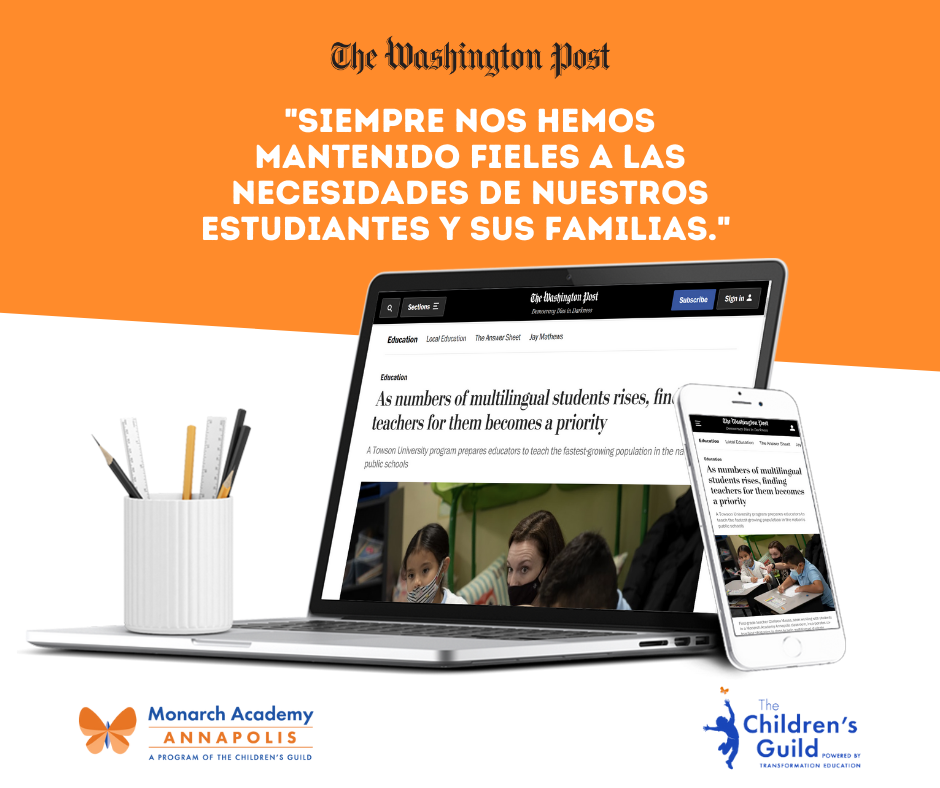 The contract school located in Anne Arundel County is part of a Towson University program that trains educators to teach ESL students at public schools.
The contract school located in Anne Arundel County is part of a Towson University program that trains educators to teach ESL students at public schools.
Monarch Academy Annapolis has been addressing the needs of multilingual learners in their classrooms by hiring and training English for Speakers of Other Languages (ESOL) teachers.
The tuition-free, publicly funded contract school open to pre-kindergarten through fifth-grade students in Anne Arundel County is focused on its mission to provide a school culture that produces students who think critically, problem solve creatively, become self-disciplined, know how to learn, and understand that the goal of life is to serve a cause larger than oneself.
Monarch has changed the rules when it comes to leading their classrooms. It’s not unusual to find an ESOL teacher working alongside a classroom teacher as an effective method of helping non-English speakers learn the English language. This co-teaching method has become an effective way to meet the growing needs of multilingual students, the fastest-growing population in the United States.
“We have always stayed true to the needs of our students and their families at Monarch Academy,” said Charlotte Manbeck, Monarch Academy Annapolis’ Principal. “More than half of the students in our classrooms currently speak Spanish at home and are learning more than one language at a time. As our community changes, we must also change with them and provide students and their families the tools they need to thrive.”
According to a 2017 Brookings Institute report, multilingual students have grown by 60 percent in the last decade. Additionally, more than 5 million students nationwide are learning English while speaking another language at home and are part of a language assistance program.
The need for ESOL teachers has also increased exponentially. Due to a lack of educators who meet these criteria, students are suffering. According to government reports, multilingual learners still show up as the lowest-performing group on graduation rates and testing despite their growing numbers.
“Our ELL population in the county is growing, and all teachers at some point are going to have an English learner in the classroom,” said Chelsea Massa, a first-grade teacher at Monarch Academy Annapolis in an interview with The Washington Post. “They need to know what makes that student unique, how can I meet their needs, and also make sure that they’re being heard and understood in the appropriate way.”
Massa is part of the ELEVATE program at Towson University College of Education. This initiative trains teachers through partnerships with six schools in Anne Arundel County public school district. The program emerged from a $2.7 million grant from the U.S. Education Department focused on training ESL educators in the state of Maryland and supporting those who already have the certification.
As part of the program, the ESOL teachers at Monarch meet with the college’s team once a week for targeted training to improve the education provided to the 90 multilingual students enrolled at the school.
“We make sure our lesson plans and curriculum for the semesters align with the needs of ESL students,” said Alyssa Danick, ESOL instructor at Monarch Academy Annapolis. Our participation in the ELEVATE program has enhanced the way we approach lesson plans, student needs, and also has helped us to learn new ways of integrating the English language.”
While educators continue training to meet the needs of students, Monarch continues to integrate language development tools into their lesson plans, classrooms, and instruction tools. With the help of a 2017 grant, the school is also working on a take-home bilingual book club that will provide English and Spanish books for the families that speak Spanish at home.
“We are so excited about our bilingual book club,” said Miguel Vicente, Bilingual Community Engagement Liaison. “This initiative will help students and their families come together and learn together. We are thrilled to take the next step toward helping our students thrive and feel like every day they are getting more and more comfortable with a new language both at home and at school.”

Recent Comments